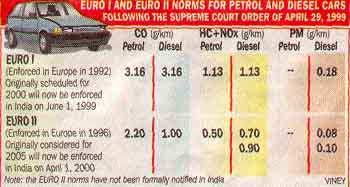
|
Environmentalists - Cleaner Air Environmentalists have hailed yesterday's Supreme Court order on stringent emission norms for automobiles as a shot in the arm for those campaign for cleaner air in the Capital. The landmark judgement, they feel, will at last apply the brakes on the exponential growth in the number of automobiles in Delhi, which is said to have more vehicles than the other three metropolises put together. The Centre for Science and Environment (CSE) noted that the judicial initiative would bring some order by its restrictions on car sales and insistence on compliance with stringent emission norms.
Ms Sunita Narain, deputy director of CSE, said the order would act as a check on dieselisation and control overall vehicular emissions for which her organisation has been campaigning for long. "For the first time, the notion of controlling the number of polluting vehicles to reduce pollution has been legally established by setting a monthly quota for registration of vehicles in the city", she said. Though the Supreme Court has been hearing pleas for banning diesel cars in Delhi, the net has now been widened in terms of making both diesel and petrol vehicles comply with stringent emission norms. "This is a very important step to control air pollution in the city", she said, adding that for the first time now, auto manufacturers would complete with each other on the basis of the emission levels for selling their product. The Society for Development of Environmental Laws and management noted that the apex court's order would compel the Indian industry work out modalities to implement the stringent pollution control norms and standards being followed in European countries. Mr. Dilep Goswamy, secretary of the society, felt the order would give a big boost to research and development activity for developing eco-friendly devices. The CSE, on the basis of annual growth rates, has projected that Delhi would have 24 lakh cars by 2009-10, that is over three times the number as of March 1998. The diesel car population, too, would have witnessed a significant jump as every car manufacturer, taking advantage of the price differential between petrol and diesel, was launching diesel versions. Not by cars aloneThe Supreme Court order banning the registration of any private, non-commercial vehicles that do not conform to the Euro-II emission norms after April 1 next year should be welcomed as a measure of the apex court's concern over the worsening levels of air pollution in the Capital. The court also directed Delhi's transport authorities to register no more than 1,500 vehicles per month from June 1 next. These measures should bring some relief to the average citizen who has to cope with levels of atmospheric pollution that are among the worst in the world. It should also force the car companies to move fast to comply with internationally acceptable emission norms. Considering the growing competion in the Indian auto industry in recent years, this should in fact spur the pace of modernisation which should do good to the industry in the long run. Having said that, it must be pointed out that the problem of auto-generated pollution in the Capital is far more complex than what the Supreme Court can comprehend or handle. Passenger cars are minor sinners when compared with the levels of toxic emissions spewed out by private commercial vehicles and the State-run transport buses. The poor quality of diesel supplied by the government is another major source of high degrees of toxic fumes and particulate matter in the city's atmosphere. It must also be borne in mind that it is not the number of vehicles so much as the hurdles in the way of smooth movement of traffic that is the principal culprit. Frequent traffic jams due to poor traffic management by the concerned authorities cause pollution at important road junctions. Lane discipline is followed only in the breach, and the traffic authorities do not seem particularly keen on enforcing it. The roads laid by the various agencies, including the Capital's two municipal bodies, are so shoddily made that they would rate as minor scams. The encroachments in the path of traffic are a common feature indicating collusion of the civic staff and the police with the offenders. For a pedestrain to think of walking down one of Lutyen's tree-lined avenues in New Delhi's commercial district is a nightmarish experience, and venturing on a bike would be risking one's life or limb. In the circumstances, it would take more than implementation of emission norms by the car-makers to lessen the city's pollution. The apex court may consider hauling up various agencies of the government whose failure to do their duty is the major reason why the Capital's air is fast turning into a vatered down version of the gas chamber. |
[ Back] Quiz| News| Teen Articles| Adult Articles| Fiction| Health| Jokes| Collegiates| Teasers| Games| Cartoons| Paintings| English Novels| English Poems| Hindi Novels| Hindi Poems| Products| About Us | Kids Club| Classifieds| Contribution| Greetings| Guest Book| Message Board| Feedback| Home |
